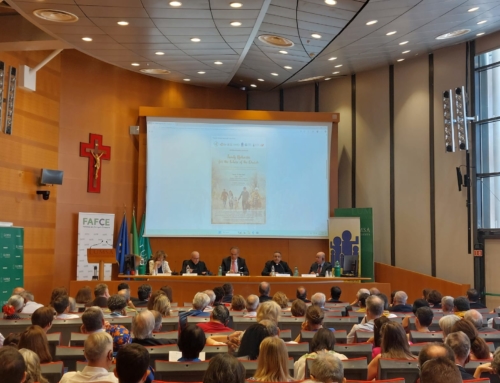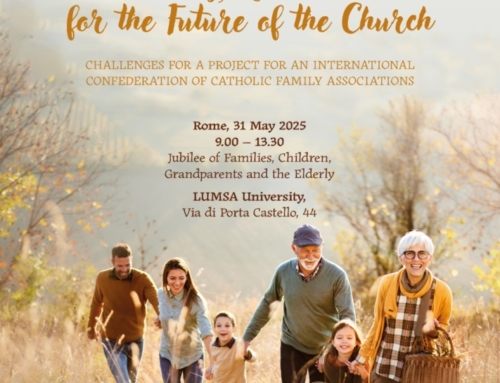Brussels, 15 June 2020
As the pandemic is slowly fading away, it is now time to reflect on these last months of the crisis and lockdown. This period saw a brutal halt of the world as we knew it. Yet, adversity shows the solidity of a society, and the family has never been more visible and its absence in some situations even more. The economy and the work made room for the real heart of our communities: the family.
During this period, FAFCE continued its work to promote the importance of the family, who has been in the front line of the pandemic, both towards the European Union bodies and the Council of Europe.
FAFCE repetitively recalled the importance of the family as people’s rock in the adversity. The lockdown had its share of struggles, but provided an opportunity to rediscover our relationships and our role as “missionaries” of the Good News. Our Member family associations remained committed to supporting families in these difficult times, and demonstrated a remarkable unity when calling decision-makers for more solidarity in Europe. FAFCE also reminded Member-States of the necessity to efficiently support families during the Covid-19 pandemic, especially through the facilitation of access to liquidities through credit and easing family spending via the “Next Generation EU” (the EU recovery fund after the Covid-19 crisis): if there will be a such recovery plan, this cannot neglect European families, it is a question of fairly recognising their role during the crisis.
More specifically, we raised awareness on the crucial need to protect our most vulnerable members, especially elderly persons. Although they are an integral part of the family, they have often been put aside in the management of the crisis. In these post-pandemic times, elderly persons should be cared for with special attention within the family, in order to prevent situations of loneliness and abuse. Yet, they are not only vulnerable people to be cared for, but also and foremost active members of our communities, who often help parents take care of their children. With this in mind, FAFCE currently cooperates with COMECE for an ad-hoc working group to elaborate a reflection paper focused on the care for the elderly and on their role in the intergenerational solidarity.
In a context of schools and university closures and online schooling, children’s access to education represents a real concern. FAFCE co-signed on the 16th of June, along with 40 European and international organisations, the Manifesto “Europe must not forget independent education and educational pluralism”. We recall that many non-state public schools greatly suffered from the pandemic and often lacked material resources to ensure the continuity of education. All schools provide a public service for society and they should not be treated differently. Additionally, non-public schools allow major savings to the public finances: supporting them means supporting all parents and investing in the future.
On the long run, FAFCE has been closely following the question of demographic challenges with the new start of the European Commission and the European Parliament in the Fall and with the Croatian Presidency of the Council of the EU since January, who set demographic challenges as one of its top priorities. I met on the 25th of February with the European Commission Vice-President for Democracy and Demography, Dubravka Šuica, whose Cabinet just released a Report on Demographic Change (17 June 2020). In the European Parliament, we welcomed in January the creation of an Intergroup on Demographic Challenges, Family-Life Balance and Youth Transitions. At the same time, FAFCE’s perspective was echoed in two reports on demography drafted respectively by the European Economic and Social Committee and by the Committee of the Regions, which underlined the importance to consider family spending as an investment, the crucial statement that “having a child should not be a cause of poverty” and the long-term necessity to provide young couples wishing to start a family with a welcoming environment and family-friendly policies. To reflect on all these progresses within the European Union, FAFCE organised a Webinar on the 25th of June on “Demographic Challenges and Sustainable Development” and invited representatives of the European Commission, of the Croatian Presidency and Members of the European Parliament. This Webinar stressed the importance for the recovery tools currently developed to directly benefit families. As I stated during the Webinar, “we need to build a new paradigm to put the family at the centre of long-term public policies in Europe”. Families need concrete actions to respond to their needs when facing the consequences of the pandemic and of the demographic changes.
Also last month, FAFCE took a strong position regarding surrogacy following the scandal in Ukraine, where a video showed 46 babies, born from surrogacy, waiting for foreigners who agreed a contract for their purchase to be allowed to enter the country. FAFCE reiterated its call on European decision-makers to take the necessary steps to ban the practice of surrogacy internationally. FAFCE worked both within the European Parliament and the Council of Europe to raise awareness on this worrying reality and on the striking violations of human rights that the practice of surrogacy constitutes.
Finally, FAFCE remains committed to supporting the mother’s freedom to participate in the labour market and for couples to organise on their own terms their work-life balance. Our Project Manager, Bénédicte Colin, intervened on this subject at the last Plenary Session of the Conference of INGOs of the Council of Europe (22-23 June 2020), reminding that a true “‘emancipation’ of women presupposes giving them the mental and cultural freedom to decide for themselves about their work-life balance”. At the European Parliament, FAFCE raised awareness on the motherhood gap, and the need to recognise unpaid work as a work freely offered by parents for society.
Finally, I would like to share some important news with you: on the 20th of June, I had the chance to meet – together with my family – Pope Francis. I took this opportunity to highlight the role of family associations in this epochal change. I stressed that our associations have a great responsibility in the new evangelisation, because we can play a key role in connecting the Church and families. Family associations are crucial because they are networks of families, and they must take this responsability to understand families and to be a « village » for them. After this exchange, that came three years after the FAFCE Audience with the Pope on the occasion of its 20th Anniversary, we felt very much encouraged going forward in our work in favour of the recognition of the family as a resource at the service of the whole society.
Thank you very much for your support. So many of you have been reading our press releases with attention, have been following our activities expressing your warm support, and have been supporting us financially (this is still much needed as we would like to keep going on in the same direction, with at least two people working permanently in our office in Brussels), but above all, many of you who have been praying for our special mission.
Thank you,
Vincenzo Bassi
FAFCE President







